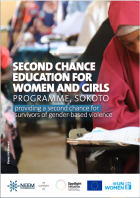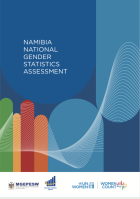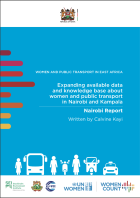1 - 10 of 10 Results
Date:
Under the Joint UN-EU Spotlight initiative, the Second Chance Education center for Women and Girls, Sokoto, was established to ensure GBV survivors in Sokoto get a second chance at economic empowerment and basic education. This document highlights some of the human impact stories made by the Joint UN-EU Spotlight initiative in Sokoto
Date:
This Report presents the Africa Shared Research Agenda (ASRA) for ending gender-based violence (GBV), which was developed though a collaboration between UN Women Africa and the Sexual Violence Research Initiative. The ASRA is a set of research priorities for the field, developed through a participatory and consultative process and aims to inform investments in research over the coming 5-10 years for ending GBV in Central, East, Southern and West Africa.
Date:
The identification of gender data and capacity gaps in the national statistics system is one of the first steps that has to be executed when working towards the increased production and use of gender statistics in a country. This report summarizes the findings of such an assessment done in Nambia during 2022. The findings will be used to inform planning, resource allocation and programming towards the improvement of gender statistics in the country.
Date:
This brief gives an overview of the Gender Statistics programmes across East and Southern Africa.
Date:
This study is part of a series and was aimed at identifying the general public transport needs of women in Kenya’s capital and identifying the obstacles faced by women in accessing and using public transport. The study also set out to identify interactions between women’s economic activities and public transport use and barriers and identify incidents of gender-based violence (GBV) including harassment of women commuters in Nairobi.
Date:
This analytical study covered ten countries in the region and looked at issues of access to justice for women and girls in East and Southern Africa.
Date:
The review indicated that Ethiopia has not only ratified many of the conventions and treaties related to refugees and asylum seekers, but also formalized these laws into its Constitution and in the national Refugee Proclamation. However, a closer analysis of the health sector focusing on sexual, reproductive, maternal, newborn, child and adolescent health (SRMNCAH) services to women and girls in the humanitarian settings, the laws, policies, strategies, guidelines, programs, and plans of the sector indicated a clear gap.
Date:
The purpose of this study was to develop a variety of texts documenting case studies of good and promising practices in the area of the protection of rights and access to services for women with disabilities in East and Southern Africa (ESA) during the COVID-19 pandemic.
Date:
The UN Women WCARO annual report aims to share information about the regional office's activities on women empowerment and gender equality in 2020. The said year has been a particularly difficult year around the world with the COVID-19 pandemic. In West and Central Africa (WCA), women and girls were particularly vulnerable to the crisis. To counter these burdens and build medium and long- term recovery measures, the UN Women WCA Regional Office successfully provided multi-faceted assistance...
Date:
This continental study provides a contextual analysis of the forced displacement of women and girls in Africa based on first hand data from field visits made to the Central African Republic, Ethiopia, and Nigeria. The analysis provides the key priority considerations for the realisation of durable solutions for refugees, IDPs and returnees in Africa and makes recommendations for actions by the AU, Member States and relevant stakeholders within the context of AGA and APSA.










